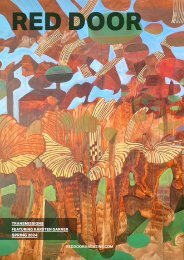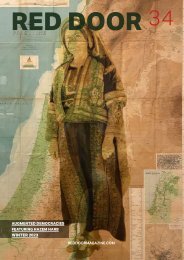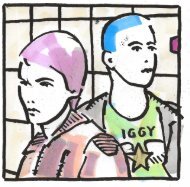Red Door Magazine 23
Visit www.reddoormagazine.com
Visit www.reddoormagazine.com
You also want an ePaper? Increase the reach of your titles
YUMPU automatically turns print PDFs into web optimized ePapers that Google loves.
ON SKINSHIP<br />
BY BRIAN RICHARD BERGSTROM<br />
Being a translator, I find myself developing<br />
fondnesses for certain words—and especially types<br />
of words—that exist in one language and not in another.<br />
In Japanese, there is a class of words called<br />
waseigo ( 和 製 語 ), or “language made in Japan.”<br />
This refers specifically to words adapted from other<br />
languages but put to new uses within Japanese.<br />
One of my favorite pieces of waseigo is the word skinship<br />
(sukinshippu / スキンシップ). It’s a waseigo that<br />
seems to fill such an obvious need that it makes the<br />
language from which it’s derived seem impoverished<br />
for lacking it. Skinship is the term for the aspect of a<br />
relation that arises from physical touch – the “ship”<br />
is from “friendship,” and just as that word refers to<br />
the various aspects of being friends, skinship indicates<br />
various roles skin can play, the ways it enriches<br />
and defines the relations that make up life itself.<br />
Whenever I think of this term, I think of a story I translated<br />
(that remains unpublished) called “Naked” by a<br />
wonderful woman writer named Fumio Yamamoto.<br />
“Naked” tells the story of a woman who has fallen out<br />
of the workforce and the marriage system and is in<br />
a kind of melancholy limbo. Soon, though, she finds<br />
something to attach to: the body of a man she meets<br />
one late night at a manga café, a “loser” named Little<br />
Ken who once worked for her, back in her former life<br />
as a hard-charging working woman. Little Ken is consistently<br />
compared to a puppy, and she is bemused<br />
to find that she takes solace precisely in his losery<br />
doggishness. The animal self he signifies for her, the<br />
animal comfort he provides by lying next to her and<br />
offering his body so guilelessly, both grounds and<br />
de-centers her. She chastises herself a bit for the ease<br />
with which she succumbs to her own longing:<br />
He and I are perfect together, a perfect pair<br />
of losers, I thought, without a hint of malice<br />
or contempt. All it took was a bit of<br />
contact between my naked body and his<br />
to get me liking some guy I’d never given a<br />
second thought to before, it seemed – never<br />
underestimate the power of sheer skinon-skin.<br />
I struck myself as a bit funny<br />
at that moment, as well as a bit stupid.<br />
What I translate as “sheer skin-on-skin” is the waseigo<br />
“skinship,” a word that seems infinitely more precise, if<br />
only it actually existed in English. In this instance, skinship<br />
refers to a sexual closeness (so “skin-on-skin” is<br />
appropriate), but it can refer to non-sexual instances<br />
of touch as well, such as between a parent and child<br />
or between friends.<br />
Here it refers to something within sex that isn’t reduceable<br />
to the sexual—the animal being within us<br />
that needs to feel the animal being of others, that<br />
communicates feeling that cannot be expressed in<br />
words, but rather only gestured at, via terms like “skinship.”<br />
Never underestimate the power of this, Yamamoto<br />
says here, spelling it out explicitly in a throwaway<br />
line.<br />
The relationship of the power of touch to the present<br />
circumstance during the COVID-19 pandemic is so<br />
obvious it’s a bit embarrassing to even mention. But<br />
dwelling on touch is an unavoidable part of the way<br />
this crisis feels. Think about the people most important<br />
to you and count how many you can touch, and<br />
then how many you are waiting to be able to touch<br />
again, and then count the weeks till when that might<br />
be for each one. I think of my parents, just turned 70<br />
and living in rural eastern Washington State in the<br />
U.S., in a situation where social contact is relatively<br />
easy to avoid. At the same time, they are lifelong volunteer<br />
firefighters, a calling that has developed into<br />
also being volunteer first responders. My mother has<br />
a condition that compels her to take immunosuppressants,<br />
so she does not go on calls, but my father is<br />
still compelled to. Yes, it’s volunteer, but if he doesn’t,<br />
who will? This is the choice the infrastructure of the<br />
rural U.S. compels.<br />
I talk to them on the phone, across a now-closed<br />
U.S.-Canadian border, hearing how my father is the<br />
mobile one, his body going to town and sometimes<br />
going out to try to save his neighbors’ lives, then returning<br />
home. I worry about contagion coming back<br />
home with him, his body’s one version of vulnerability<br />
availing another to my mother’s.<br />
They both assure me that all necessary precautions<br />
are being taken, and I am relieved until they tell me<br />
a story of my father going on a call to the house of a<br />
woman who has hemorrhaged internally. The hemorrhage<br />
is fatal, but at the family’s behest, the first<br />
response team must perform life-saving procedures<br />
until she is declared officially dead at the hospital.<br />
This translates into my father performing CPR on her<br />
for over an hour in the ambulance between her house<br />
and the hospital, resulting in the internal bleeding<br />
becoming external, bathing the inside of the ambulance<br />
and his body with blood from her mouth for the<br />
length of the trip. Laughingly, my mother recounts<br />
my father’s return to the house “covered in blood still”<br />
and bundling him and his equipment into the shower.<br />
“What about the special precautions?” I ask, to which

















